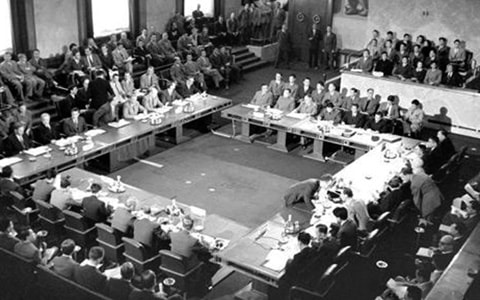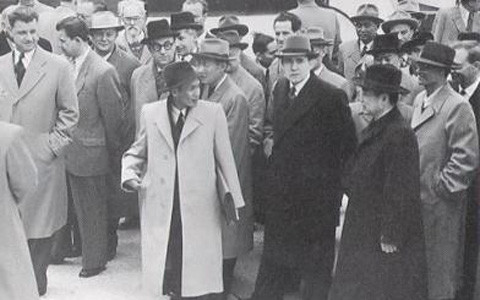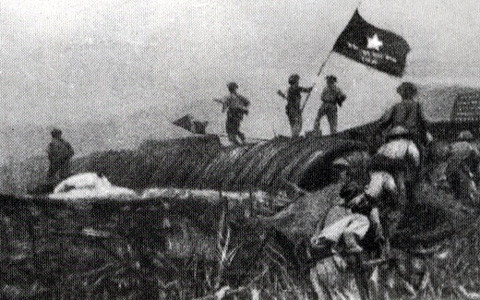Geneva Agreement: International factors beneficial to Vietnam
Some researchers believe that the Indochina War was "inserted into the global conflict between East and West".
 |
| Panorama of the 1954 Geneva Conference. Photo archive |
The influence of the international situation on the Geneva Conference
Professor H. Totraith of Paris I University believes that 1953 was a year of political change in Moscow along with the death of Stalin.
In the United States, Dwight D. Eisenhower became President of the United States. At the Berlin Conference held on January 15, 1954, all four major countries were present. The main idea of the Conference was to organize in peace, gathering the main relevant actors - later known as the Geneva Conference.
According to Associate Professor, Doctor Vu Quang Hien - Hanoi National University - During this period, the Yalta bipolar world order and the "cold war" situation were among the factors that dominated the Geneva Conference. Since 1950, the war in Indochina had become an international issue between the two socialist and capitalist camps. When some countries such as the Soviet Union and the people's democratic countries recognized and established diplomatic relations with the Democratic Republic of Vietnam, the US, the UK and some other countries recognized the Bao Dai government established by France.
Some researchers believe that the Indochina War was "inserted into the global conflict between East and West".
According to diplomatic researcher Phan Doan Nam, during this period in Europe, after the establishment of NATO, the US tried to gather forces to establish the so-called European Defense Community to rearm Germany and prepare to bring Germany into NATO.
In addition, in order to persuade France to join the “European Defense Community”, the US tried to provide aid to France, which was bogged down in the war in Indochina. In 1950, the US only provided 10 million USD in aid, and by 1954 it had reached 2 billion USD, accounting for 80% of France’s military expenditure in Indochina. The US’s purpose at this time was to take advantage of the “cold war” to impose an American-style peace on the whole world, first of all in the capitalist system.
However, the US was now losing its monopoly on nuclear weapons when the Soviet Union (in August 1953) successfully tested a hydrogen bomb and continued to research and manufacture missiles) and after the Soviet Union besieged and blockaded Berlin, the US found it impossible to continue using military threats to solve the problems of World War II, mainly the problems of Germany and Austria, but had to solve them within the framework of negotiations between the four powers occupying Germany (Soviet Union, US, UK, France).
Also according to researcher Phan Doan Nam, in Asia, at this time after the Korean War, although the United Nations forces led by the US finally pushed the Chinese-Korean forces back to their original starting position of the 38th parallel, the US came to the conclusion that "it should not rush into another war on the Asian continent".
After the Korean War, France suffered a great defeat at the Dien Bien Phu campaign (Vietnam), with the aim of ousting France, turning Indochina into a new American colony, and at the same time establishing the US-led SEATO bloc as a bulwark against communism in this region.
 |
| Deputy Prime Minister Pham Van Dong - Head of the negotiating delegation of the Democratic Republic of Vietnam at the Geneva Conference. (Photo: Freddy Bertrand) |
The interests of Britain and France after World War II were to restore the lost colonial system. To achieve this goal, these two countries had to rely on the United States to restore their post-war economies, but they also had to be wary of the plot to “Americanize” their colonies. Therefore, although they still had to follow the United States in fighting international communism, Britain and France tried their best to make peace with the Soviet Union (on the German and Austrian issues) and with China (on the issues in Southeast Asia).
Britain had great interests in Southeast Asia and Hong Kong. It believed that the communist movement in Southeast Asian countries was being manipulated by China. Therefore, Britain strongly opposed the US's intention to launch Operation Eagle to rescue France in Dien Bien Phu and did not agree with the establishment of SEATO before the Geneva Agreement on Indochina for fear of being dragged into a confrontation with China in this region.
France had major interests in Indochina - where France and China had signed many agreements dividing mutual interests before 1954. On the other hand, France was also wary of the US taking advantage of it in Indochina to gradually oust France from this region. Therefore, despite pressure from the US, France still limited the activities of the US military delegation (MAAG) and hesitated in giving the governments of the Indochinese countries of the French Union (the puppet governments of Bao Dai, Ai Lao and Cao Mien) independence and especially in building their own armies under the direction of US military advisors.
Internal alliance complexities
According to the book "Outline of Vietnamese History" edited by Professor Le Mau Han, during this period, countries allied with Vietnam such as China and the Soviet Union had a policy of soon reaching a peaceful solution to the Indochina problem in the style of the armistice in Korea.
The Standing Committee of the World Peace Council also passed a Resolution (September 10, 1953), calling on people of all countries to fight to end the war and peacefully resolve the Indochina issue.
The 3rd World Trade Union Congress held in Vienna (Austria) in October 1953 took December 19, 1953 as the world labor day to actively unite with the Vietnamese people, demanding an end to the French colonial war of aggression.
 |
| Dien Bien Phu victory - the decisive factor leading to the parties having to recognize Vietnam's independence |
However, the internal situation of the US allies and the Soviet Union at that time was not very peaceful. According to researcher Phan Doan Nam, within the Soviet Union there was a policy of reconciliation with the West, first of all with the US. On the other hand, the negotiation mechanism between major countries such as Germany and Austria was still maintained and Far East issues with China were put aside.
The US came to the Geneva Conference mainly because of the Korean issue. After the negotiations on the Korean issue failed, US Secretary of State John F.Dulles left and left only Deputy Secretary of State B. Smith to follow the conference to prepare for the plan to break the agreement and jump into South Vietnam later.
On May 12, 1954, the US Government instructed its delegation at the Geneva Conference that: “The United States is not prepared to express its approval or tacit acceptance of any armistice, ceasefire or any other solution…”.
Meanwhile, Britain came to the Conference to oppose France and the United States joining together to intervene in Indochina. This would be harmful to Britain's efforts to stabilize the situation in its colonies in Southeast Asia and the Middle East. Britain wanted to stabilize the situation in Indochina on the basis of dividing Vietnam, because Britain believed that division was the least bad solution. Britain wanted that fence to be as far north of Vietnam as possible.
France came to the Conference to seek an armistice to save the French expeditionary army from being destroyed and to maintain French interests in Indochina.
In that context, in Vietnam, while answering an interview with Expressen (Sweden), President Ho Chi Minh clearly stated the stance of our people: "Resolutely resist until final victory. But if the French government has learned a lesson from the war in recent years and wants to reach a peaceful ceasefire in Vietnam, the people and the Government of the Democratic Republic of Vietnam are ready to accept that wish."
Although the world situation was complicated, it also had many advantages for Vietnam. On May 8, 1954, the International Conference on Ending the War in Indochina opened in Geneva. After 8 plenary sessions and 23 small sessions, on July 21, 1954, the Armistice Agreements in Vietnam, Laos, and Cambodia were signed one after another. The final declaration on the restoration of peace in Indochina was accepted and officially committed by the representatives of the countries attending the Conference. The US representative issued a separate statement acknowledging respect for the Agreement.
Through international factors, we see that the Geneva solution on restoring peace in Indochina is a reflection of the relative strength of the warring parties on the battlefield in Indochina and the forces of major powers on the international arena, reflecting the extremely complex international relations and strategic intentions of Vietnam's allies in the final steps of the peace negotiations.
According to VOV






